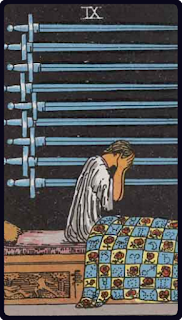
Representing anticipation; the 9 of Swords represents anxiety and depression, the anticipation of thought amplifies the significance of thought beyond its true magnitude. Worry amplifies worry, despair deepens despair.
In the upright state the 9 of Swords represents our fixation on past events and our obsession with entertaining negative thoughts. In the upright state we relive our trauma and carry it with us allowing it to dominate our thoughts and influence our actions.
In the inverted state the 9 of Swords represents our affinity to external influences that impact us negatively. We feed our anxiety and despair with negativity. In the inverted state the 9 of Swords warns us of the impact of this focus and calls upon us to shift our perspective to align with something that has a positive influence.
In the Rider-Waite deck a solitary figure sits up in bed with their head in their hands while 9 swords hang upon the wall above them. The swords are horizontal not pointed up or down they represent the memory of conflict and its role as the backdrop of the scene of our mindset. The figure sits in a bed with a quilt adorned in roses, literally creating a bed of roses, alternated with symbols of the Zodiac representing the passage of time, the endurance of trauma and dwelling on things we cannot change are emphasised here.
The number 9 itself in Spiritual beliefs is often associated with the Rule of Three or the Law of Return where we receive in return that which we gave times three. The 9 of Swords therefore can be seen as the echo of the 3 of Swords, our past failure to overcome the triple influence of our lack of ambition, lack of faith, and our insecurity taken together return threefold by the power of three times three creating a paralysing force. The 9 of Swords can therefore be considered the literal depiction of anxiety, depression, and despair caused by overwhelming thoughts and beliefs that we fail to overcome.
In self-reflection the 9 of Swords serves as a prompt to consider what is within your grasp, and what is not. This is your opportunity to consider the future within a given timeframe and determine what it is realistic to achieve in that timeframe.
One of the fundamental misconceptions people hold when it comes to traditional therapy is the idea that it is intended to “fix” you.
This is not the goal of therapy in any form.
You are not broken.
The purpose of therapy is acceptance, and the mitigation of the negative impact on our lives, so far as is reasonable that we can achieve. Accepting who we are, and the reality of the life we have lived is the foundation we build upon when planning for our future. Everyone can benefit from therapy as it is useful to identify where the cracks in our foundation exist or where they might appear so that we can reinforce our foundation before we place a greater weight upon it as we build onward and upward.
Introspection can only achieve so much; taking language as an example, no amount of self-examination and reflection can teach us a language, it is essential that we acquire new information, vocabulary, grammar, syntax, and exposure to new experiences, reading, writing, speaking, and listening to that language in use in order to master it.
The same applies to our own mental health and wellbeing, we cannot answer every question within ourselves through introspection and self-reflection that we may wish to ask. It is the job of a therapist to have a wider scope of knowledge and experience which we can then draw upon as patients. Whilst some of this knowledge and experience can be learned for ourselves through self-directed study, knowing where to look and what questions to ask is ultimately limited by our existing knowledge and experience. Even as these both grow over time; both exist in isolation as a tree that branches out as our understanding grows from what we already know.
For a therapist however this knowledge does not exist as a single tree but as multiple, each embodying collections of concepts and information. Whilst many elements of psychology can be interlinked, as mentioned before there are situations such as past trauma that can fundamentally change the way we approach our understanding of a concept – retracing our steps for instance is a good place to start when reflecting on past experiences but due to the nature of trauma and the impact it has on our brain this act can amplify the influence of that trauma. Breaking down past trauma has to be done within a set framework and a clinical approach that minimizes this risk, it’s not advisable to attempt to do this yourself.
The 9 of Swords is your moment to ask “Can I do this on my own?” and be objective when answering that question. There is no shame in answering “No” – remember that ‘shame’ is quite unique in the myriad of emotions that humans experience because it does not originate in the self but rather it is put there by someone or something else that triggers it - a belief, a stigma, an expectation not met, or an act of judgement or some other source, humans do not naturally feel shame, they learn to feel shame by these external influences – quite proverbially Adam and Eve in a Biblical sense did not feel shame until they learned of shame after eating the fruit of the tree of knowledge.
Knowing the limit of your understanding and recognising the utility of discussion and debate is important to grow your understanding and overcome the barriers that life creates.

No comments:
Post a Comment
All comments are moderated before they are published. If you want your comment to remain private please state that clearly.